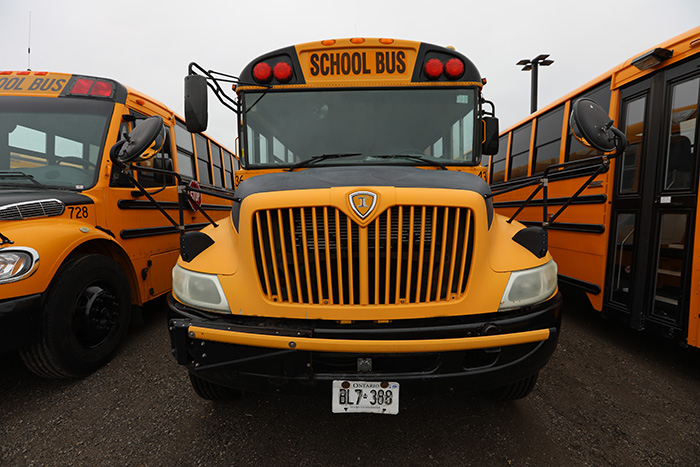2019 Canadian Hillman Prize Winner

In Spring 2018, CBC’s The Fifth Estate launched a major investigation to find out: were school buses really safer without seatbelts? Transport Canada, the federal regulator, had assured parents for decades that school buses did not need seatbelts, repeatedly touting their own 1984 study that showed they might even make them more dangerous.
School buses transport more than 2 million children to school each day across Canada and numerous deaths and more than ten thousand injuries have occurred in school bus accidents in the intervening years.

The Fifth Estate’s five-month investigation exposed serious flaws in the science behind Transport Canada’s 1984 study and revealed that Transport Canada had already concluded in a 2010 follow-up study — that they did not disclose to the public - that school buses without seatbelts had “failed” important safety tests in side impact and rollover crashes.
And yet, Transport Canada’s study had become the “most widely cited” study in North America, paving the way for an absence of seatbelts on school buses not just in Canada but also across the United States.
Records obtained by The Fifth Estate show that Transport Canada had initially wanted to put seatbelts on school buses and had even set a date for the rule to take effect in the late 1970s. But after some “aggressive” lobbying by school bus operators and school boards, the proposed seatbelt law was withdrawn. The top concern: the “cost-benefit ratio due to the low number of accidents involving school buses,” according to a 1985 Transport Canada document summarizing the plan to withdraw the seatbelt requirement on school buses.
Today, numerous U.S. federal and state regulators and safety organizations like the National Safety Council have turned their backs on the 1984 Transport Canada study, leaving the Canadian government increasingly isolated in its official anti-seatbelt stance. A growing number of U.S states — making up 40% of the population — now require three-point seatbelts on their school buses.
The Fifth Estate constructed a database of dozens of scientific studies and academic journals on the topic, meticulously amassing a 124-page chronology of events that detailed facts and statistics of those studies and their findings.
They discovered that Transport Canada’s seminal study was at odds with numerous, yet less publicized, academic studies and journals repeatedly demonstrating that seatbelts prevent injuries and save lives on school buses.
And then, in an on-camera interview, a Transport Canada engineer admitted for the first time that she believed seatbelts should be installed on school buses.
The reaction to the story was enormous across the country, in school boards, in classrooms, and in Ottawa. For the first time, Transport Canada issued a statement on its website — acknowledging that seatbelts on school buses do prevent injuries. And the Transport Minister has formed a task force with the provinces to look at implementing seatbelts on school buses across the country.
Harvey Cashore’s journalism career began in Ottawa, where he investigated and researched a biography of former Prime Minister Brian Mulroney. Since then, in his 30 years as an investigative journalist, his work has focused on exposing abuse of power and holding decision-makers to account. Cashore’s work helped reveal that a former Canadian Prime Minister received secret cash payments from an offshore Airbus grease-money account, helped expose the stolen lottery ticket scandal, revealed a bogus academic study that wrongly claimed body-checking in children’s hockey would not cause more injuries, helped overturn a wrongful murder conviction and exposed a notorious offshore tax avoidance “sham” for wealthy Canadians orchestrated by one of Canada’s top accounting firms. Cashore reminds anyone who will listen that it was the Liberal-dominated Finance Committee that suddenly shut down their probe into the firm’s tax abuse scheme in 2017, for reasons not fully explained. He still plans to find out.
Bob McKeown has had a unique career in broadcast journalism on both sides of the Canada-U.S. border. During five decades at three networks, he’s reported from 70 countries (including 15 war zones) and he’s been recognized with numerous major journalism awards. Americans first heard his name in 1991 when he and his CBS News crew reached Kuwait City almost a day before American and Allied troops, as Iraqi occupiers fled at the end of Operation Desert Storm. His coverage of the liberation was acclaimed as ‘the best story of the Gulf War’ and ‘a world scoop.’ McKeown went on to spend almost a decade and a half in the U.S., including nine years as a Correspondent with ‘Dateline NBC,’ where he reported extensively on 9/11, tracked down war criminals, covered hurricanes and tornados, broadcast live from the wrecksite of the Titanic and was bitten by a shark — on camera. McKeown returned to Canada in 2003, rejoining The Fifth Estate, the CBC’s flagship investigative program. Including his stint there before the U.S. adventures, McKeown is now in his 25th season as Host/Reporter with The Fifth Estate. A graduate of Yale University, he spent 5 years after college playing professional football, an all-star in the Canadian Football League and a Grey Cup champion with the Ottawa Rough Riders.
Kimberly Ivany landed a permanent gig with The Fifth Estate in 2016 while working on a story in Madrid - probably one of the most exciting calls she’s ever received. She has experience in both local and national CBC newsrooms and reported for the World Council of Churches in South Korea in 2013. She has won two Canadian Screen Awards and was a 2016 Canadian Hillman Prize winner for her work on CBC’s Missing and Murdered Indigenous Women project. Her most recent stories include Unbuckled, as well as the treatment of OPP officers suffering from PTSD. Her true passion is telling stories about people. When she’s not holding the government to account or encountering whimsy in Toronto, you can find Kimberly at a dance studio or an airport. Likely the latter.
Aileen McBride is a Toronto-based editor and producer who has been working in documentary film and television for twenty years. McBride’s commitment to investigative journalism and public service broadcasting brought her to the CBC in 2003. For the past 16 years she has contributed to numerous programs at the public broadcaster including The National, Marketplace, and currently The Fifth Estate. McBride has received numerous awards for her work. She has three Gemini awards including Best Picture Editing for Chasing the Cancer Answer, a Marketplace investigation into rising cancer rates in Canada. Her work on The Fifth Estate’s Made in Bangladesh, which probed the Canadian connection to dangerous working conditions for garment workers, earned her a Canadian Screen Award and an International Emmy.
Saman Malik is an investigative journalist at CBC’s The Fifth Estate. She began her career in Karachi, Pakistan and since then she’s fact-checked for The New York Times, freelanced for VICE and produced live journalism panels for Tina Brown’s Women in the World Summit. In addition to Unbuckled, her reporting has included investigating allegations of sexual harassment at one of Canada’s most famous theatre companies and Bruce McArthur and 1970s unsolved serial killings. Malik holds a master’s degree in documentary filmmaking from Columbia University’s Graduate School of Journalism.
Doug Husby has been with the CBC for 39 years — first at CBC Winnipeg radio, next shooting current affairs for the local show 24 Hours, and then in 1984, moving to The Journal in Toronto which morphed into The National in 1993. Husby has filmed documentaries, feature interviews and specials as far afield as Russia, Afghanistan, New Zealand, South Africa, and Korea — including with Joni Mitchell, Pierre Trudeau, David Bowie, Paul McCartney, Bill Clinton, Leonard Cohen and the first foreign press interview with President Obama. For the last three years, he has been a videographer dedicated to The Fifth Estate.
Lisa Mayor is an investigative journalist at CBC’s The Fifth Estate. Since joining The Fifth Estate in 2015, she has investigated and reported on the disappearance of four elderly people from rural Ontario and a woman from remote northern Newfoundland, sexual harassment and assault against female firefighters, and how governments profit from gambling addiction.

